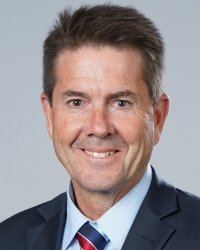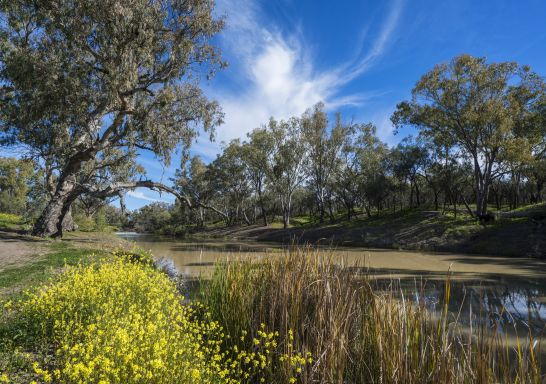New shots fired in Murray-Darling debate
Luke Williams
23 February 2023, 2:40 AM
 Darling-Bakka River: Source Wikipedia.
Darling-Bakka River: Source Wikipedia. The debate over the fate of the Darling River is once again heating up.
With deadlines looming: the Commonwealth authorities, the state Government as well as The Dharriwaa Elders Group all began laying out their cards on the issue this week.
New South Wales Water Minister Kevin Anderson said he will use a national meeting of water ministers on Friday to ask for an extension on our state's obligation to return to 450 gigalitres of environmental water to the Murray-Darling.
The $13 billion basin plan's deadline for water recovery is June 2024.
As it stands hundreds of gigalitres of water are yet to be recovered to Murray-Darling. This has sparked the Murray-Darling Basin Authority (MDBA) to warn the NSW plan won't be completed on time.
The announcement comes with calls for more funding by the NSW and after the 2019 threats by the former NSW deputy leader John Barilaro that his Coalition Government would walk away from the plan.
Minister Anderson wants a commitment from the Commonwealth that water buybacks won't be used to meet a 450 gigalitres of environmental water savings target.
Returning 2,100 gigalitres of water to the environment since the Murray-Darling Basin plan was legislated in 2012, almost 50 gigalitres of water is yet to be recovered toward the "Bridging the Gap" target.
MDBA authority has also said there is a major shortfall from state-run projects intended to recover around 605 gigalitres for the environment.

ABOVE: NSW Water Minister Peter Anderson. Image: NSW Government.
In 2018 all water ministers agreed to a plan with strict criteria to ensure “no socio-economic harm” would come to communities when returning water to environment.
However, there are questions now over whether this plan is legally binding and South Australia says it no longer intends to follow this criteria.
But Minister Anderson said he was against any attempts to remove the socio-economic test on water recovered to meet the 450-gigalitre target.
"Not only does it permanently reduce the amount of water available for regional communities in the long term, it increases the price of water for other users, and reduces agricultural productivity in regional areas," Mr Anderson said.
The MDBA anticipates less than half the of the 450 gigalitre target may be recovered on time and predicts it could take up to a decade beyond the June 2024 deadline for the Government to complete all water return projects.
Dharriwaa Elders Group asks for Water Resources Plans to be rejected
Long before the target of 450 gigalitre is supposed to be met the NSW Government is required to submit periodical Water Resources Plans for the Darling-Baaka.
The Western Plains App has learned the Walgett-based Dharriwaa Elders Group (DEG) have urged the Federal Environment Minister to reject the NSW Government’s Water Resources Plan for the Darling-Baaka which they say hands “billions of dollars” in assets for free to big corporate irrigators.

ABOVE: Darling-Baaka in Walgett. Image: Visit NSW.
“There is far too much extraction going on upstream of Walgett,” DEG General Manager Wendy Spencer told the Western Plains App.
The purpose of the Darling Alluvium Water Resource Plan (this Plan or Darling Alluvium WRP) is to set out how NSW will meet its obligations under the Murray-Darling Basin Plan 2012 (Basin Plan).
Under the basin plan, NSW is required to submit twenty 'Water Resource Plans' which set out how water is collected and divided within individual river systems.
Ms Spencer said the plan was not lawful because under Murray Darling Basin Authority and the Commonwealth Water Act, state governments are required to consult with first nations people and DEG were not consulted.
The NSW Government have submitted recently submitted an extensive set of documents setting out its Darling Alluvium Water Resource Plan to the Commonwealth.
In its submissions the NSW Government says “For the purposes of section 10.53 of the Basin Plan: - NSW consulted with relevant Aboriginal organisations about the process for engaging with First Nations to prepare the WRP…Native Title Services Corporation was contacted as part of WRP consultation activities”.
“We thank the Elders, representatives of the Barkandji and Maljangapa, Budjiti, Euahlayi, Murrawarri, Ngemba and Wailwan Nations, and Aboriginal communities who provided their knowledge throughout the planning process”
However, Ms Spencer says the consultation was not wide-ranging enough to meet the legal criteria, that the levels of water extraction are still too high and that the regulation of the Darling-Baaka was the “biggest food security issue” facing the Walgett.
“The Commonwealth needs to reject the Water Resource Plan,” she told the Western Plains App. “We had great hopes that the Albanese Government would finally be the ones who could step in on this river. We still hope they can, but we have approached Tanya Plibersek’s office and basically been fobbed off."
“I think the problem is that Plibersek’s office still has the same advisors as the previous Government and so they are getting bad advice.”
A spokesperson from the Commonwealth Department of Climate Change, Energy, the Environment and Water told the Western Plains App that:
- Water resource plans must meet the 55 requirements of the Basin Plan and be compliant with water management law in NSW.
- Under the Water Act, the Murray–Darling Basin Authority must recommend a plan for accreditation if all requirements are met.
- First Nations advice is sought as part of the assessment process, and the Authority considers the advice in its assessment of each plan.




